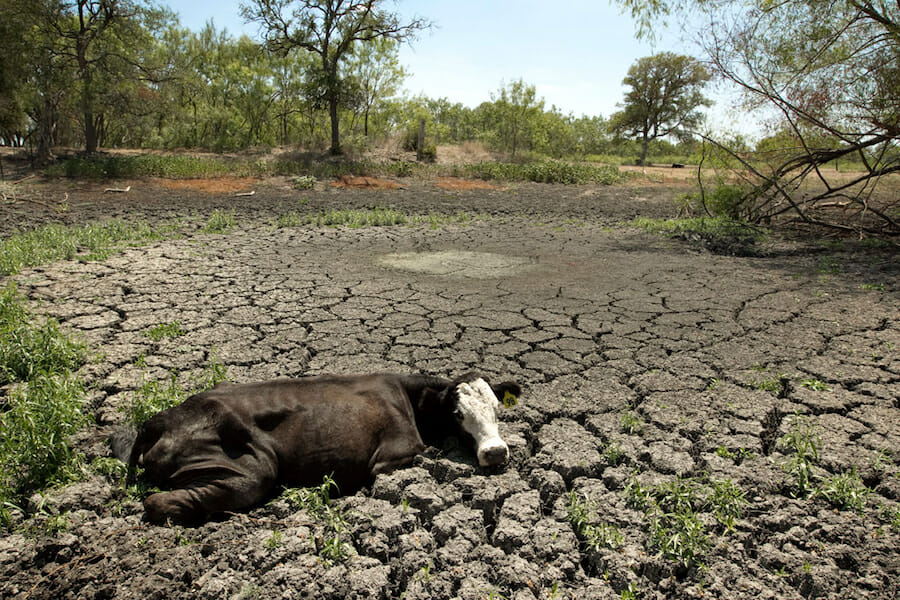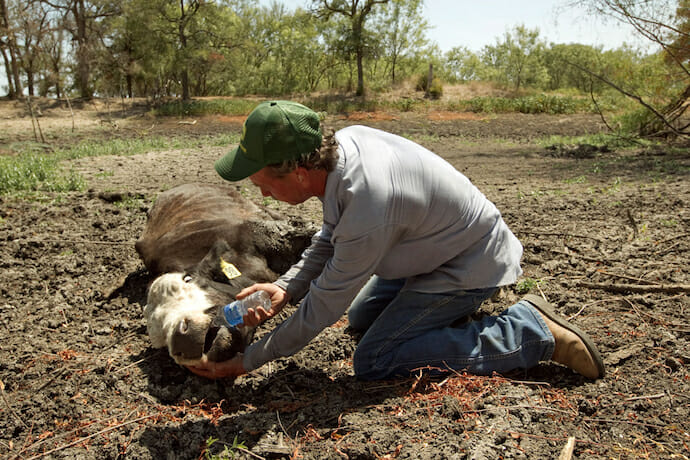
The Texas Cowboy in Drought
Ag Web, an online agricultural news outlet, reports the latest on the Texas climate: more than 96 percent of the state is experiencing drought. Farmers and ranchers who once thrilled to work the land have seen their livelihoods reduced to daily drudgery by the three-year drought. From the Panhandle to the Rio Grande, the soil cleaves and crumbles from dehydration. Skin-and-bones cattle lie down to die, 70 mph dust devils careen across the plains, and bass fight for oxygen in vanishing lakes and ponds.
Texas society has responded in various ways. Suburban dwellers have cut back on outdoor water use. Government officials have sued neighboring states to claim more water and invested in technology to turn sewage into potable water. Wes Perry, an oilman who also serves as the mayor of Midland, said, “We are worthless without water.” He and many Texas business leaders recognize the need for good water policy as the state prepares to welcome millions of new residents to the Sunbelt. The Lone Star state is projected to increase its population by 82 percent between 2010 and 2060.
The Texas rancher, long emblematic of the West, likewise struggles amidst the heat. Their livelihood has required climate adaptation for generations. Their fathers battled the 1950s drought; their grandfathers battled the Dust Bowl. Now, the current generation’s test has come.
At the year’s beginning, the Texas cattle inventory stood at 11.3 million, its lowest level since 1967. Herds have declined for want of drinking water and pasture/feed water. The last three summers were among the hottest in Texas history—2011 being the worst on record.
The 2011 summer resulted in $7.6 billion in agricultural losses, felt across the state. Even before the recent drought struck, farmers and ranchers in the Panhandle debated the future of the Ogallala aquifer, which has seen its water levels decline precipitously.

“If we just project the rates of depletion now for the next 20 to 30 years, you can see 35 percent of the irrigated land won’t be able to support irrigation if they continue in the same way they have been,” said Bridget Scanlon, a scientist at University of Texas. “The basic thing in the southern High Plains is they’re mostly pulling out ‘fossil’ groundwater. It’s like you have money in the bank but you’re not putting anything back.”
Climate science predicts more and worsening droughts as atmospheric carbon dioxide concentrates further. All good farmers and ranchers know their weather history. “I know our rainfall is less, our patterns have changed,” said David Ford, who raises corn, cotton, and cattle in the Panhandle. He recalls the August thunderstorms that once rejuvenated the soil. “We haven’t had that kind of rain in 10 years.”
But most Texas ranchers do not bother with the theory behind the weather. The hardest-hit ranching communities in Texas are in the Panhandle, one of the most conservative regions in the state. In this vast countryside, there is resistance to climate science. Panhandle Congressman Mac Thornberry (R-TX) believes prayer is the only response to changing climate. Gov. Rick Perry, also a Republican, denies that humanity has had a hand in climate change.
Many believe they and their herds can endure the drought one more summer—resourcefulness and pride are the cowboy way. Some pray for the unpredictable El Niño climate phenomenon to bring rain. Some have experimented with breeding American cattle with African and Caribbean cow genes to raise their drought tolerance.
They cling emotionally to their heritage. “We do love our livestock,” said Phillip Smith, co-owner of the Sunshine Ranch in Texas. “Like to see them come into the world. It’s a miracle, to give birth to one of those calves. We enjoy propagating life, watching our cattle grow. It’s certainly a pleasure. It’s a business, yes, but it’s also part of our lives.”
They take all possible measures to preserve Lone Star heritage for another generation. Seventy-four-year-old Cotton Dietrich of West Texas sold his entire cattle herd in 2011 because of the drought. “After a while you just laugh at it, keep from crying,” said Cotton.

